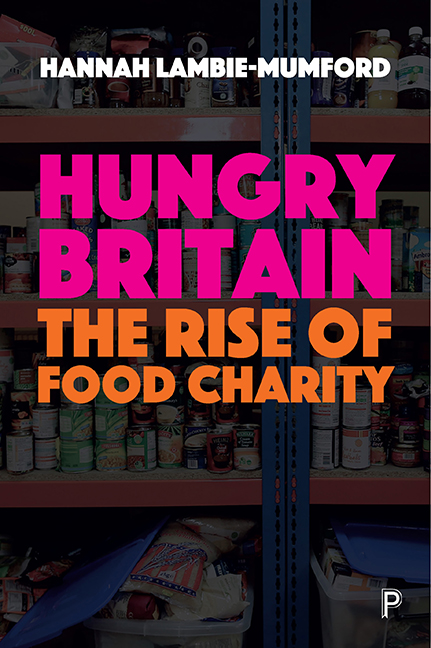Book contents
- Frontmatter
- Dedication
- Contents
- List of figures
- List of abbreviations
- Acknowledgements
- Foreword
- One Introduction
- Two Hunger and charitable emergency food provision in the UK and beyond
- Three Theories of the food insecurity ‘problem’ and the right to food ‘solution’
- Four Food charity: the ‘other’ food system
- Five The sustainability of food charity
- Six Food charity as caring
- Seven Food charity and the changing welfare state
- Eight Conclusion
- References
- Index
Eight - Conclusion
Published online by Cambridge University Press: 05 April 2022
- Frontmatter
- Dedication
- Contents
- List of figures
- List of abbreviations
- Acknowledgements
- Foreword
- One Introduction
- Two Hunger and charitable emergency food provision in the UK and beyond
- Three Theories of the food insecurity ‘problem’ and the right to food ‘solution’
- Four Food charity: the ‘other’ food system
- Five The sustainability of food charity
- Six Food charity as caring
- Seven Food charity and the changing welfare state
- Eight Conclusion
- References
- Index
Summary
The empirical chapters of this book explored the acceptability and sustainability of emergency food systems in relation to the availability and accessibility of the food they provide (Chapters Four and Five), and the role of charity and the state in this provision and in relation to the right to food (Chapters Six and Seven). In doing so, these chapters explored emergency food provision as a system and the adequacy of that system in terms of its social acceptability and sustainability, as well as critically engaging with the role of charity in helping people to access food.
A large amount of data was collected through the duration of this study. This book has done its best to shed light on the wide range of insights and detail this data provided into the emergent and changing phenomenon of emergency food provision in the UK. Its system-level analysis and wider sociopolitical critique enabled the presentation of new findings about these systems, their relationship to wider social and political shifts and their future trajectories.
These findings reveal the complexity of emergency food systems in relation to the range of moral and ethical motivations and values that give meaning to the endeavour, from the perspective of those running these organisations and local projects. The analysis also highlights some of the tensions embedded within these systems in terms of the accessibility of the food to those in need. Framing the analysis with a sociopolitical critique enabled the book to explore how the emergence of these systems is intimately connected to shifts that open up space for this kind of provision – such as a retrenched welfare state and increasingly diversified safety nets – and link to wider political and discursive shifts that emphasise individualised responsibility and risk for poverty.
This concluding chapter discusses some of the key findings arising from these analyses, how they extend our knowledge of emergency food systems and their implications for how we might progressively realise the right to food in the UK. Guided by the theme of ‘opportunities in crisis’, the chapter emphasises the question of what can be done on the basis of the findings, and how the circumstances underpinning emergency food provision and the need for it may present a chance for more progressive ways forward. Emphasis is therefore placed on the implications of the findings, and how they can practically be responded to.
- Type
- Chapter
- Information
- Hungry BritainThe Rise of Food Charity, pp. 133 - 152Publisher: Bristol University PressPrint publication year: 2017

